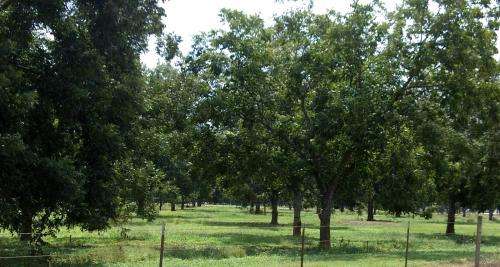Pros and cons of Texas fruit production entices growers meeting in College Station

If Texas fruit growers can manage their acreage and orchards past a plethora of pests, a willing market for local produce awaits, experts at the third annual Texas Fruit Conference in College Station.
"The total horticulture value is increasing for several reasons," said Dr. Marco Palma, Texas A&M AgriLife Extension Service horticulture economist in College Station. "But there is a lot of competition. You have to perform your services in a way you can add value."
Palma told more than 100 people attending the conference hosted by AgriLife Extension that values are increasing for fruit because of the increased population, new international markets, year-round demand and the fact that consumers are willing to try new products.
He gave the example of a pumpkin grower who, rather than advertising pumpkins, offers farm experiences for a higher fee and allows participants to take home a pumpkin when they leave.
"There are several ways you can compete no matter what you produce," he said. "You have to be the lowest cost, lowest price operator, and you can sell directly to the consumer, for example."
Palma noted U.S. fruit growers now are faced with increasing issues beyond the field. Fruit producers now must consider that there is more competition worldwide (with 50 percent of the nation's fruit consumption grown in some other country), more concerns with food safetyand more regulations, increasing fuel and energy costs, and the availability and price of labor, he said.
Participants also learned about many of the farm-level production issues to watch for on a variety of fruit crops.
Dr. David Appel, AgriLife Extension plant pathologist in College Station, described a variety of pathogens that attack the roots of many fruit plants. He said starting with healthy plants and preparing the planting area are the first defenses in establishing a fruit production operation.
"Sometimes you set yourself up to live with these pathogens," Appel said. "You buy a plant from someplace else and plant it in your area. A problem comes from having a pathogen, a host and a favorable environment."
Appel described several common root diseases seen in fruit species. Symptoms include lower productivity, sparse and yellowing foliage, limb die-back, cracks and oozing at the base of the tree, varied rates of death and water sprouts or new growth that pops out on trunks.
If problems develop after planting, Appel suggested that the Texas Plant Diagnostic Lab operated by AgriLife Extension can help determine what the problems are so producers can determine how to bring their crops back toproductive levels.
Provided by Texas A&M University





















